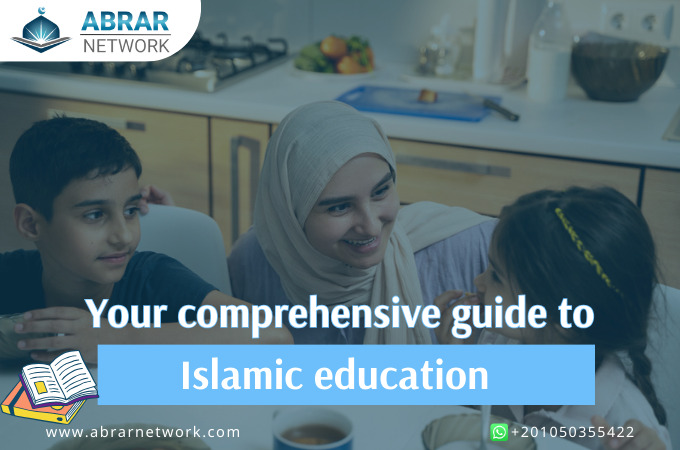Islamic education is a rich and multifaceted tradition that encompasses the teachings, values, and practices of Islam. Rooted in the Quran and the teachings of Prophet Muhammad, it provides a comprehensive framework for intellectual, spiritual, and moral development. With its principles of Tawhid (Oneness of Allah), the Prophetic model, and the integration of knowledge, Islamic education seeks to nurture individuals who are not only knowledgeable but also embody the virtues of compassion, justice, and humility. This article explores the foundations, methods, and fields of Islamic education, shedding light on the sources, principles, and practices that shape this timeless tradition of learning and personal growth.
What is the concept of Islamic education?
The concept of Islamic education refers to the system of education that is based on Islamic teachings, principles, and values. It encompasses the acquisition of knowledge and skills in various fields, such as religious studies, Quranic sciences, Islamic law, history, ethics, and other subjects, all within the framework of Islamic beliefs and teachings.
Education in Islam has a holistic approach, aiming to develop individuals who have a strong understanding of Islam and its teachings, and who strive to apply those teachings in their personal and social lives. It seeks to nurture individuals who are committed to their faith, possess moral integrity, and contribute positively to their communities.
The importance of Islamic education
The importance of Islamic education lies in its role in preserving and transmitting the teachings of Islam from one generation to another. It serves as a means to ensure the continuity of Islamic values, culture, and identity. Education in Islam equips individuals with the knowledge and understanding necessary to live according to Islamic principles and to fulfill their religious obligations.
Islamic education also plays a crucial role in shaping individuals’ character and moral values. It emphasizes the development of virtues such as honesty, compassion, justice, patience, and humility. It encourages critical thinking, intellectual growth, and the pursuit of knowledge in all fields, fostering a well-rounded individual.
Furthermore, Education in Islam promotes social cohesion, unity, and a sense of belonging among Muslims. It fosters a strong community spirit and encourages individuals to actively engage in acts of charity, social welfare, and the betterment of society.
In summary, Islamic education encompasses the teachings and values of Islam, aiming to provide individuals with knowledge, spiritual growth, moral development, and a sense of identity. It is essential for preserving Islamic heritage, nurturing individuals’ faith, and promoting positive contributions to society.
What are the objectives of Islamic education?
The objectives of Islamic education can vary depending on the specific context and level of education. However, some overarching objectives can be identified:
1- Knowledge of Islam
The primary objective of Islamic education is to provide individuals with a comprehensive understanding of Islam, its beliefs, principles, and teachings. This includes knowledge of the Quran, Hadith (sayings and actions of Prophet Muhammad), Islamic law (Sharia), theology, ethics, and other aspects of Islamic studies.
2- Faith and Spiritual Development
Education in Islam aims to nurture individuals’ faith in Islam and their spiritual growth. It seeks to strengthen their relationship with Allah (God) through deepening their understanding of Islamic beliefs, engaging in acts of worship, and cultivating a sense of devotion and piety.
3- Moral and Ethical Development
Islamic education emphasizes the development of moral values and ethical conduct based on Islamic teachings. It aims to instill virtues such as honesty, integrity, compassion, justice, tolerance, and respect for others. The objective is to shape individuals with strong moral character and ethical principles that guide their actions and interactions with others.
4- Application of Knowledge
Education in Islam encourages the practical application of knowledge in daily life. It seeks to equip individuals with the skills and understanding necessary to implement Islamic teachings in various aspects of their lives, including personal conduct, family life, social interactions, and professional endeavors.
5- Social Responsibility
Islamic education emphasizes the importance of social responsibility and encourages individuals to actively engage in acts of charity, community service, and the betterment of society. It promotes a sense of social justice, equality, and compassion, calling for individuals to contribute positively to their communities and address societal challenges.
6- Intellectual and Academic Growth
Education in Islam values intellectual growth and encourages critical thinking, research, and the pursuit of knowledge in all fields. It seeks to foster a well-rounded individual who is intellectually curious, open-minded, and capable of engaging in constructive dialogue and discourse.
7- Preservation of Islamic Heritage
Islamic education aims to preserve and transmit the rich Islamic heritage from one generation to another. It seeks to ensure the continuity of Islamic knowledge, culture, and traditions, thereby safeguarding the identity and legacy of the Muslim community.
Read also about: Islamic Dawah
What are the sources of Islamic education?
The sources of Islamic education are primarily rooted in Islamic scripture, tradition, and scholarly works. The following are the main sources of Islamic education:
1- The Quran
The Quran is the central religious text of Islam and is considered the word of Allah (God) as revealed to Prophet Muhammad. It serves as the primary and foundational source of Islamic education. It contains guidance on various aspects of life, including faith, worship, morality, social justice, and personal conduct.
2- Hadith
Hadith refers to the sayings, actions, and approvals of Prophet Muhammad. Hadith collections, such as Sahih al-Bukhari and Sahih Muslim, are important sources of Islamic education. They provide insights into the life and teachings of the Prophet, offering guidance on religious practices, ethics, and various aspects of human behavior.
3- Islamic Jurisprudence (Fiqh)
Fiqh is the Islamic jurisprudential framework that deals with legal and practical aspects of Islam. Scholars study the Quran, Hadith, and other sources to derive legal rulings and guidance pertaining to acts of worship, transactions, family matters, social interactions, and more. Fiqh texts and legal opinions (fatwas) serve as sources of Islamic education in matters of Islamic law.
4- Tafsir
Tafsir refers to the scholarly interpretation and commentary of the Quran. Tafsir works provide explanations of the verses of the Quran, exploring their meanings, historical context, and implications. They help individuals understand the deeper messages and teachings of the Quran.
5- Islamic History and Biography
The study of Islamic history and biographies of important figures, including Prophet Muhammad and other early Muslims, contributes to Islamic education. These sources provide insights into the establishment and development of Islam, the struggles faced by early Muslims, and exemplary role models for Muslims to emulate.
6- Islamic Literature and Poetry
Islamic literature, including Sufi poetry and philosophical works, offers valuable insights into the spiritual dimensions of Islam and the quest for self-realization and closeness to Allah. Works by renowned scholars, philosophers, and poets, such as Rumi, Ibn Arabi, and Al-Ghazali, provide inspiration and guidance.
7- Islamic Educational Institutions
Education in Islam institutions, such as madrasas, Islamic universities, and Islamic schools, play a crucial role in disseminating Islamic education. These institutions offer structured programs and courses that cover various aspects of Islamic studies, including Quranic sciences, Hadith, Islamic law, theology, and Arabic language.
8- Scholars and Teachers
Scholars and teachers who specialize in Islamic studies and related fields play a vital role in transmitting Islamic education. They provide guidance, deliver lectures, conduct research, and produce scholarly works that contribute to the understanding and dissemination of Islamic knowledge.
Read also about: Islamic Personality
Fields of Islamic Education
1- Quranic Studies
This field focuses on the study of the Quran, including its recitation, memorization, understanding of its language, interpretation (tafsir), and the application of its teachings in daily life.
2- Hadith Studies
Hadith studies involve the study of the sayings, actions, and approvals of Prophet Muhammad. It includes the classification, authentication, interpretation, and application of Hadith in various aspects of Islamic life.
3- Fiqh (Islamic Jurisprudence)
Fiqh deals with the understanding and application of Islamic law (Sharia) in various spheres of life, such as acts of worship, transactions, family matters, ethics, and social interactions. It involves the study of legal principles, methodologies, and the derivation of legal rulings from primary Islamic sources.
4- Aqeedah (Islamic Creed)
Aqeedah focuses on the study of Islamic beliefs and theology. It covers topics such as the oneness of Allah, the attributes of Allah, prophethood, the belief in angels and the afterlife, and other core tenets of faith.
5- Islamic History
Islamic history explores the history of Islam from its inception, including the life of Prophet Muhammad, the spread of Islam, the development of Muslim empires, and significant events and figures in Islamic history.
6- Arabic Language
The Arabic language is essential for the study of Islamic education. It involves learning Arabic grammar, vocabulary, syntax, and rhetoric to understand the Quran, Hadith, and other Islamic texts in their original language.
7- Sufism and Spirituality
This field focuses on the inner dimensions of Islam, including spiritual purification, self-discipline, and the path to attaining closeness to Allah. It involves the study of Sufi literature, practices, and the teachings of renowned Sufi scholars.
8- Comparative Religion
Comparative religion explores the similarities and differences between Islam and other religions. It aims to promote understanding, dialogue, and respect among different religious communities.
Methods of Islamic education
Traditional Methods: Traditional methods of Islamic education include one-on-one instruction (known as the “Mentor-Disciple” relationship), lectures, recitation and memorization sessions, and studying under qualified scholars in Islamic educational institutions.
1- Islamic Schools and Madrasas
Islamic schools and madrasas follow a structured curriculum that integrates Islamic studies with general subjects. They provide a comprehensive education in various fields of Islamic knowledge.
2- Online and Distance Learning
In recent years, online platforms and distance learning programs have emerged as alternative methods of Islamic education. These platforms offer courses, lectures, and resources that facilitate remote learning and access to Islamic education from anywhere in the world.
3- Islamic Seminars and Conferences
Seminars and conferences provide opportunities for scholars, educators, and students to come together, share knowledge, present research papers, and engage in discussions on various topics related to Islamic education.
4- Publications and Media
Education in Islam is disseminated through books, journals, articles, audio recordings, and video lectures. Publications and media platforms serve as valuable resources for individuals seeking to expand their Islamic knowledge.
5- Community and Mosque-based Education
Community centers and mosques often offer educational programs, study circles, and classes on Islamic topics. These informal settings provide opportunities for learning and spiritual growth within local communities.
6- Personal Study and Self-learning
Individuals can engage in personal study and self-learning by accessing online resources, reading books, and seeking guidance from scholars. Self-learning encourages individuals to take responsibility for their own education and pursue knowledge independently.
Read also about: Quran Ijazah
Principles and foundations of Islamic education
Principles and foundations of Islamic education are derived from the Islamic worldview, teachings, and values. They provide a framework for the development and implementation of Islamic educational practices. Here are some key principles and foundations of Islamic education:
1- Tawhid (Oneness of Allah)
The principle of Tawhid forms the foundation of Islamic education. It emphasizes the belief in the oneness of Allah, acknowledging Him as the ultimate source of knowledge and guidance. Islamic education aims to cultivate a deep understanding of Tawhid and its implications in all aspects of life.
2- Prophetic Model
Islamic education takes inspiration from the life and teachings of Prophet Muhammad. The Prophet’s character, integrity, and his role as a teacher and exemplar provide a model for Muslims to follow. Islamic education seeks to instill the values and qualities exemplified by the Prophet, such as compassion, justice, humility, and knowledge.
3- Quranic Guidance
The Quran serves as the primary source of guidance in Islamic education. Its teachings provide a moral and ethical framework for individuals to live by. Islamic education seeks to help individuals understand the Quran and apply its teachings in their lives, fostering a deep connection with the divine message.
4- Integration of Knowledge
Islamic education emphasizes the integration of religious and worldly knowledge. It rejects the dichotomy between religious and secular education, seeking to bridge the gap between religious teachings and various academic disciplines. This integration allows individuals to develop a comprehensive understanding of the world while maintaining their Islamic identity.
5- Moral and Ethical Development
Islamic education places a strong emphasis on moral and ethical development. It seeks to cultivate virtues such as honesty, integrity, justice, compassion, and humility. The aim is to develop individuals who possess strong moral character and demonstrate ethical behavior in all aspects of life.
6- Individualization and Holistic Development
Islamic education recognizes the unique potential and needs of each individual. It emphasizes a holistic approach to education that encompasses intellectual, spiritual, emotional, and physical development. Islamic education aims to nurture well-rounded individuals who are balanced in their knowledge, character, and relationship with Allah.
7- Social Responsibility and Service
Islamic education emphasizes the importance of serving others and fulfilling social responsibilities. It encourages individuals to actively engage in acts of charity, community service, and the betterment of society. Islamic education fosters a sense of social justice, equality, and compassion, calling individuals to contribute positively to their communities.
8- Continuity and Preservation
Islamic education seeks to preserve and transmit Islamic knowledge and heritage from one generation to the next. It aims to ensure the continuity of Islamic teachings, values, and cultural identity. Islamic education plays a vital role in preserving the Islamic legacy and passing it on to future generations.
In this regard, you can communicate with Abrar Academy for Islamic Education to start enrolling your child with his colleagues, as the Academy effectively contributes to the development of the child in many skills that elevate his mind and spirit to be the best example for the Muslim person. Start by booking a free trial class, and leave it to us.



